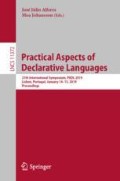Abstract
Answer set programming is a popular constraint programming paradigm that has seen wide use across various industry applications. However, logic programs under answer set semantics often require careful design and nontrivial expertise from a programmer to obtain satisfactory solving times. In order to reduce this burden on a software engineer we propose an automated rewriting technique for non-ground logic programs that we implement in a system projector. We conduct rigorous experimental analysis, which shows that applying system projector to a logic program can improve its performance, even after significant human-performed optimizations.
We are grateful to Michael Dingess, Brian Hodges, Daniel Houston, Roland Kaminski, Liu Liu, Miroslaw Truszczynski, Stefan Woltran for the fruitful discussions.
Access this chapter
Tax calculation will be finalised at checkout
Purchases are for personal use only
Notes
- 1.
- 2.
- 3.
- 4.
- 5.
- 6.
The term guards was suggested by Miroslaw Truszczynski.
References
Balduccini, M., Gelfond, M., Nogueira, M.: Answer set based design of knowledge systems. Ann. Math. Artif. Intell. 47(1–2), 183–219 (2006)
Bichler, M.: Optimizing non-ground answer set programs via rule decomposition. Bachelor thesis. TU Wien (2015)
Bichler, M., Morak, M., Woltran, S.: lpopt: a rule optimization tool for answer set programming. In: Proceedings of International Symposium on Logic-Based Program Synthesis and Transformation (2016)
Brewka, G., Eiter, T., Truszczynski, M.: Answer set programming at a glance. Commun. ACM 54(12), 92–103 (2011)
Buddenhagen, M., Lierler, Y.: Performance tuning in answer set programming. In: Proceedings of the Thirteenth International Conference on Logic Programming and Nonmonotonic Reasoning (LPNMR) (2015)
Calimeri, F., Cozza, S., Ianni, G., Leone, N.: Computable functions in ASP: theory and implementation. In: Proceedings of International Conference on Logic Programming (ICLP), pp. 407–424 (2008)
Calimeri, F., Fusca, D., Perri, S., Zangari, J.: I-DLV: the new intelligent grounder of DLV. Intelligenza Artificiale 11(1), 5–20 (2017)
Calimeri, F., Fuscà, D., Perri, S., Zangari, J.: Optimizing answer set computation via heuristic-based decomposition. In: Calimeri, F., Hamlen, K., Leone, N. (eds.) PADL 2018. LNCS, vol. 10702, pp. 135–151. Springer, Cham (2018). https://doi.org/10.1007/978-3-319-73305-0_9
Calimeri, F., Gebser, M., Maratea, M., Ricca, F.: Design and results of the fifth answer set programming competition. Artif. Intell. 231, 151–181 (2016). https://doi.org/10.1016/j.artint.2015.09.008. http://www.sciencedirect.com/science/article/pii/S0004370215001447
Eiter, T., Fink, M., Tompits, H., Traxler, P., Woltran, S.: Replacements in non-ground answer-set programming. In: Proceedings of International Conference on Principles of Knowledge Representation and Reasoning (KR) (2006)
Eiter, T., Traxler, P., Woltran, S.: An implementation for recognizing rule replacements in non-ground answer-set programs. In: Fisher, M., van der Hoek, W., Konev, B., Lisitsa, A. (eds.) JELIA 2006. LNCS (LNAI), vol. 4160, pp. 477–480. Springer, Heidelberg (2006). https://doi.org/10.1007/11853886_41
Faber, W., Leone, N., Mateis, C., Pfeifer, G.: Using database optimization techniques for nonmonotonic reasoning, pp. 135–139 (1999)
Gebser, M., Kaminski, R., Kaufmann, B., Ostrowski, M., Schaub, T., Thiele, S.: A user’s guide to gringo, clasp, clingo, and iclingo (2010). http://potassco.sourceforge.net
Gebser, M., Kaminski, R., Kaufmann, B., Schaub, T.: Challenges in answer set solving. In: Balduccini, M., Son, T.C. (eds.) Logic Programming, Knowledge Representation, and Nonmonotonic Reasoning. LNCS (LNAI), vol. 6565, pp. 74–90. Springer, Heidelberg (2011). https://doi.org/10.1007/978-3-642-20832-4_6
Gebser, M., Kaufmann, B., Neumann, A., Schaub, T.: Advanced preprocessing for answer set solving. In: Proceedings of the 2008 Conference on ECAI 2008: 18th European Conference on Artificial Intelligence, pp. 15–19. IOS Press, Amsterdam (2008). http://dl.acm.org/citation.cfm?id=1567281.1567290
Gebser, M., Kaufmann, B., Schaub, T.: Conflict-driven answer set solving: from theory to practice. Artif. Intell. 187, 52–89 (2012)
Gebser, M., Schaub, T., Thiele, S.: GrinGo: a new grounder for answer set programming. In: Baral, C., Brewka, G., Schlipf, J. (eds.) LPNMR 2007. LNCS (LNAI), vol. 4483, pp. 266–271. Springer, Heidelberg (2007). https://doi.org/10.1007/978-3-540-72200-7_24
Lierler, Y.: SAT-based Answer Set Programming. Ph.D. thesis, University of Texas at Austin (2010)
Lierler, Y., Maratea, M., Ricca, F.: Systems, engineering environments, and competitions. AI Mag. 37(3), 45–52 (2016)
Lierler, Y., Schüller, P.: Parsing combinatory categorial grammar via planning in answer set programming. In: Erdem, E., Lee, J., Lierler, Y., Pearce, D. (eds.) Correct Reasoning. LNCS, vol. 7265, pp. 436–453. Springer, Heidelberg (2012). https://doi.org/10.1007/978-3-642-30743-0_30
Ricca, F., et al.: Team-building with answer set programming in the Gioia-Tauro seaport. Theory Pract. Logic Program. 12(3), 361–381 (2012)
Author information
Authors and Affiliations
Corresponding author
Editor information
Editors and Affiliations
Rights and permissions
Copyright information
© 2019 Springer Nature Switzerland AG
About this paper
Cite this paper
Hippen, N., Lierler, Y. (2019). Automatic Program Rewriting in Non-Ground Answer Set Programs. In: Alferes, J., Johansson, M. (eds) Practical Aspects of Declarative Languages. PADL 2019. Lecture Notes in Computer Science(), vol 11372. Springer, Cham. https://doi.org/10.1007/978-3-030-05998-9_2
Download citation
DOI: https://doi.org/10.1007/978-3-030-05998-9_2
Published:
Publisher Name: Springer, Cham
Print ISBN: 978-3-030-05997-2
Online ISBN: 978-3-030-05998-9
eBook Packages: Computer ScienceComputer Science (R0)

